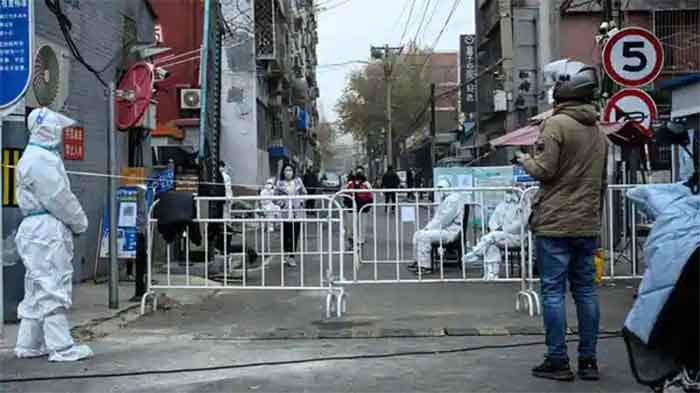
It has been written about more times than any care to remember. Pliny the Elder, that old cheek, told us that Africa always tended to bring forth something new: Semper aliquid novi Africam adferre. The suggestion was directed to hybrid animals, but in the weird pandemic wonderland that is COVID-19, all continents now find themselves bringing forth their types, making their contributions. It just so happens that it’s southern Africa’s turn.
On November 26, the Technical Advisory Group on SARS-CoV-2 Evolution (TAG-VE) was convened to assess the threat posed by B.1.1.529. Named Omicron, its emergence was reported by South Africa to the World Health Organization on November 24. While the Delta variant had continued to remain dominant, instances of this new infection had been recorded, with the first specimen collected on November 9.
Omicron’s debut brings with it a set of menacing questions. It has, for instance, a “large number of mutations”. Initial impressions point to a higher risk of re-infection relative to other variants of concern. It may have a growth advantage and spread more quickly.
This need not have happened – or at least, the risk of having such a new mutation would have been lessened – had solemn obligations to protect global public health been observed. Instead of ensuring global vaccine equity, a number of affluent countries have held up debates and filibustered their way to preventing waivers on intellectual property rights on COVID-19 vaccines.
The COVAX facility enabling the distribution of vaccines to low- and middle-income countries has been slow. Despite receiving support, in principle, from 41 high-, middle- and low-income countries last year, it had received little by way of contributions and almost nothing by way of interest by the time the report of the Independent Panel on Pandemic Preparedness had been published.
In May, the Biden administration finally relented in accepting, albeit narrowly, an IP waiver. “The Administration believes strongly in intellectual property protections,” stated Ambassador Katherine Tai of the Office of the US Trade Representative on May 5, “but in service of ending this pandemic, supports the waiver of those protections for COVID-19 vaccines.”
The response from Pfizer CEO Albert Bourla was one of panic. The proposed waiver did not consider the “scarcity of highly specialized raw materials needed to produce the vaccine.” With Pfizer’s vaccine requiring 280 different materials and elements from 19 countries, the CEO warned that inexperienced and less competent entities would rush out to mount competition for those same products. Like a dragon guarding its treasure, Bourla suggested that any such waiver threatened “to disrupt the flow of raw materials.”
A statement from the German government also summed up the mood of the affluent detractors: “[T]he limiting factors in the [availability] of vaccines are production capacities and quality standards, not patents.” There was no substitute to sophisticated technology: “high-tech shots can’t be made at the local soap factory.”
The emergence of this new variant has all the makings of a nightmare pictured in redux format, though structural biologist James Naismith is confident that this was hardly “doomsday”. The US chief of infectious diseases, Anthony Fauci, is also waiting to draw any conclusions. “Until it’s properly tested … we don’t know whether or not it evades antibodies that protect you against the virus.”
The WTO is keen to examine the variant and claims that a fortnight of studious examination is required. In what is bound to return with critical fury at some future date, it is urging caution of countries in terms of closing borders. Attention should be spent, instead, on enhancing surveillance and sequencing efforts “to better understand circulating SARS-CoV-2 variants.” Traditional reporting mechanisms should be used, and field investigations and laboratory assessments made.
Certain countries are not waiting for the laboratory reports. The issue at the start of 2020 was one of speed, or, as it transpired, lethargy. Delays and hesitancy proved catastrophic. Like the movement of capital, the SARS-CoV-2 virus spread effortlessly.
US officials have accordingly announced that flights from South Africa, Botswana, Zimbabwe, Namibia, Lesotho, Eswatini, Mozambique and Malawi will be prevented from entering the country on November 29. The UK has also blocked entry into the country from Botswana, Lesotho, Zimbabwe, Namibia and South Africa, save for UK or Irish nationals, or UK residents. “We must move quickly and at the earliest possible moment,” explained the UK Health Secretary, Sajid Javid.
The European Union has also imposed a temporary ban on travel from southern Africa. “The last thing we need is to bring in a new variant that will cause even more problems,” stated a German Health Minister Jens Spahn. The European Commission has also encouraged Member States within the EU to “activate the ‘emergency brake’ on travel” from designated southern African countries and others affected. “All travel to these countries should be suspended,” insisted European Commission President Ursula von der Leyen. “They should be suspended till we have a clear understanding about the danger posed by this new variant.”
Having full foresight and knowledge about the threat posed by such mutations, officials from the EU and the United States have again shown a selfishness in the field of vaccination policy that has served to endanger the globe, including their own citizens.
Ever slowly, the citizens of the world are coming to the realisation that such vaccines will always risk being imperilled in the absence of fair and equal distribution across the globe. Given the freedom to mutate in unvaccinated populations, more variants of SARS-CoV-2 will emerge to penetrate the protective shield.
Dr. Binoy Kampmark was a Commonwealth Scholar at Selwyn College, Cambridge. He lectures at RMIT University, Melbourne. Email: [email protected]














































